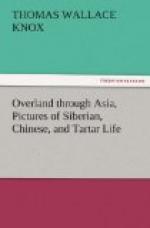Just as we finished dinner the post with five vehicles was announced. We hastened to put on our furs and sprang into the sleighs with the least possible delay. There was no fear that we should lose the first and second set of horses, but the last one might be taken for the post as the ladies had only a third-class padaroshnia. The yemshicks were as anxious to escape as ourselves, as the business of carrying the mail does not produce navodka. The post between Irkutsk and Krasnoyarsk passes twice a week each way, and we frequently encountered it. Where it had just passed a station there was occasionally a scarcity of horses that delayed us till village teams were brought.
A postillion accompanies each convoy, and is responsible for its security. Travelers sometimes purchase tickets and have their vehicles accompany the post, but in so doing their patience is pretty severely taxed. The postillion is a soldier or other government employe, and must be armed to repel robbers. One of these conductors was a boy of fourteen who appeared under heavy responsibility. I watched him loading a pistol at a station and was amused at his ostentatious manner. When the operation was completed he fixed the weapon in his belt and swaggered out with the air of the heavy tragedian at the Old Bowery. Another postillion stuck around with pistols and knives looked like a military museum on its travels.
[Illustration: THE CONDUCTOR.]
From our dining station we left the main road, and traveled several versts along the frozen surface of the Birusa river. The snow lay in ridges, and as we drove rapidly over them we were tossed like a yawl in a hopping sea. It was a foretaste of what was in store for me at later periods of my journey. The Birusa is rich in gold deposits, and the government formerly maintained extensive mining establishments in its valley.
About nine o’clock in the evening we voted to take tea. On entering the station I found the floor covered with a dormant mass, exhaling an odor not altogether spicy. I bumped my head against a sort of wide shelf suspended eighteen or twenty inches from the ceiling, and sustaining several sleepers.
“Here” said Paul, “is another chambre a coucher” as he attempted to pull aside a curtain at the top of the brick stove. A female head and shoulders were exposed for an instant, until a stout hand grasped and retained the curtain. The suspended shelf or false ceiling is quite common in the peasant houses, and especially at the stations. The yemshicks and other attaches of the concern are lodged here and on the floor, beds being a luxury they rarely obtain. Frequently a small house would be as densely packed as the steerage of a passenger ship, and I never desired to linger in these crowded apartments. A Russian house has little or no ventilation, and the effect of a score of sleepers on the air of a room is ‘better imagined than described.’




